
If you need to pull up book data for millions of books (e.g., from the standard information book title, author, and cover art to less conventional data such as book reviews and price info), where can you get it? By accessing a book database, obviously. In this article, we’ll review and analyze the most popular book databases (both paid and free) with relatively open APIs that can help you retrieve book information by ISBN.
- How to Retrieve Book Information from a Book Database
- Book Databases Overview
- Book Price Information APIs
- Other Databases
- Final Thoughts
How to Retrieve Book Information from a Book Database
Depending on your goals, you can practice different approaches to working with book databases. If your objective is to find the information about a particular book by its ISBN, you can use one of the databases we’ll cover later by accessing it via the web interface. Singular requests can be made in the search fields, and you don’t need to have any specific developer skill or knowledge to do so. Here is the example from ISBNdb:
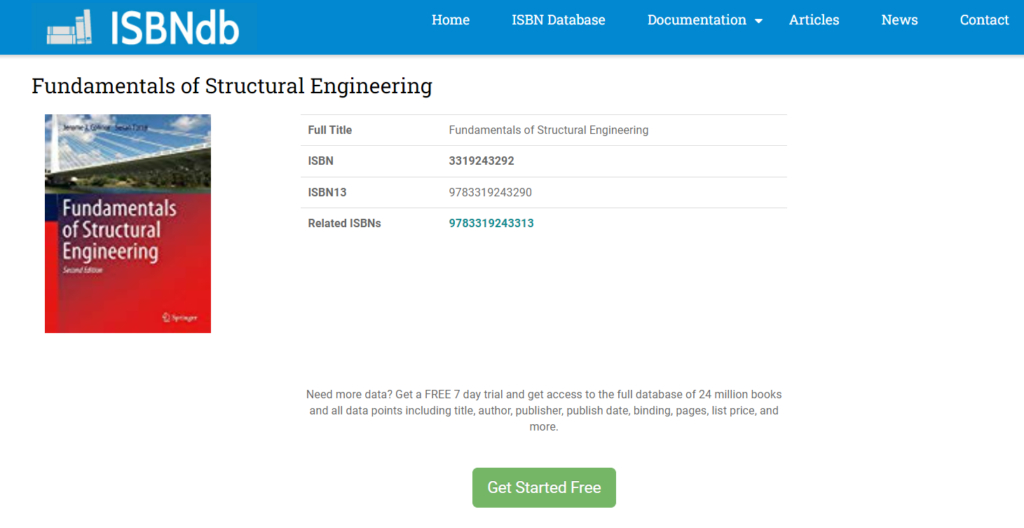
If, however, you need to retrieve large amounts of data automatically for commercial or other purposes, you need API access to book information. Most book database has an ISBN search API. To retrieve the data you need, you send an API request and get an XML or JSON response that can be further converted to a CSV file.
APIs allow searching for books via ISBN codes and, depending on your goals and the capacity of the database in question, you can get a file with all or some of the following book metadata: author, title, publisher, genre, subject, cover art, book reviews, and price information.
For instance, if you need to query college textbooks in the U.S, you need a list of their ISBNs. You will use them as an input to make a query via API and get a file with titles, authors, publishing dates, prices, etc.
Book Databases Overview
Book databases gather data from hundreds of libraries, publishers, book resellers, and various other sources. It is hard to tell whether a repository of all known ISBN exists; however, there are several extensive databases and some less complete ones with APIs for querying books by ISBN codes. There are also databases that allow querying books both in English and foreign languages. Let’s take a look at these databases and compare their offers.
Bowker
We’ll start with Bowker, which is the exclusive ISBN agency in the U.S. and Australia and the “world’s leading authority for bibliographic and publisher information.” Bowker database (Bowker Book Data) includes its own comprehensive data and the data from LibraryThing* and other partners. Bowker is the leader in aggregating all sorts of book-related data and has several options to deliver it to the end customer. Organizations can use Raw Data License and access the data via their own software. Alternatively, the Data on Demand option allows obtaining data via Bowker’s REST APIs. While the Bowker’s database is exhaustive, we can’t claim it has everything. Contact them to discuss your specific needs and access options.
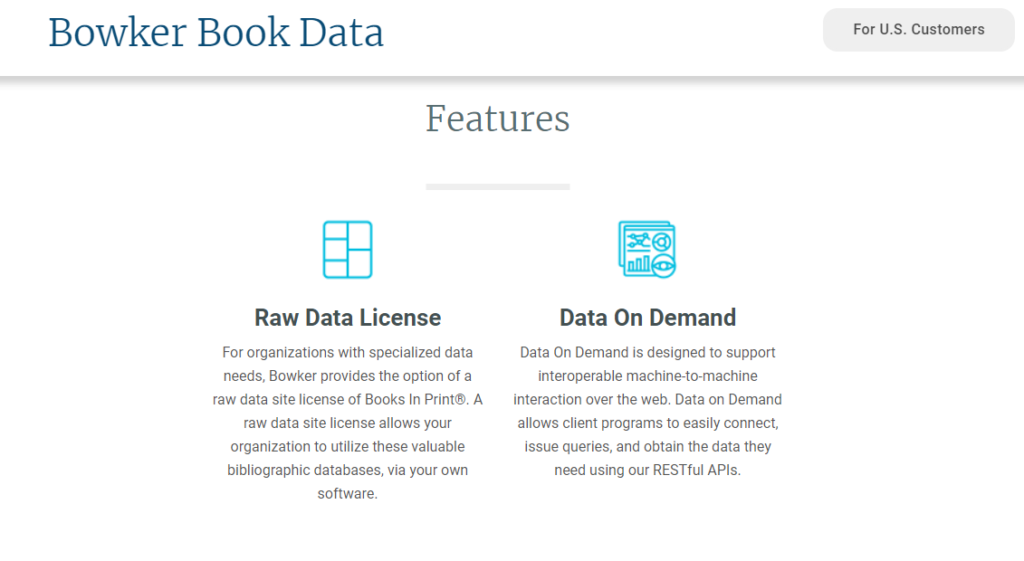
| Free access: | N/A. We haven’t found any specific information about the cost of access to the database; presumably, you can get this information by contacting Bowker. |
| API: | http://bms.bowker.com/help/ |
| Volume: | 50+ million entries |
| Cover art: | Yes |
| Price information: | Yes |
| Important Note: | LibraryThing used to offer its own LibraryThing APIs, which are currently disabled. |
Ingram Content Group
Ingram provides services to the book publishing industry and is a major book distributor in the U.S., distributing to 40,000+ retailers. Among them are such large publishers as Barnes & Noble and small local independent bookstores, libraries, schools, and universities. Ingram also provides enhanced data services for bookstores. The company collects data and images from 30,000+ publishers in a variety of formats and promises that it’s the most accurate data in the industry. To learn more about their services and prices, you need to fill out the form with your business name and description, contact details, and your plans regarding book data.
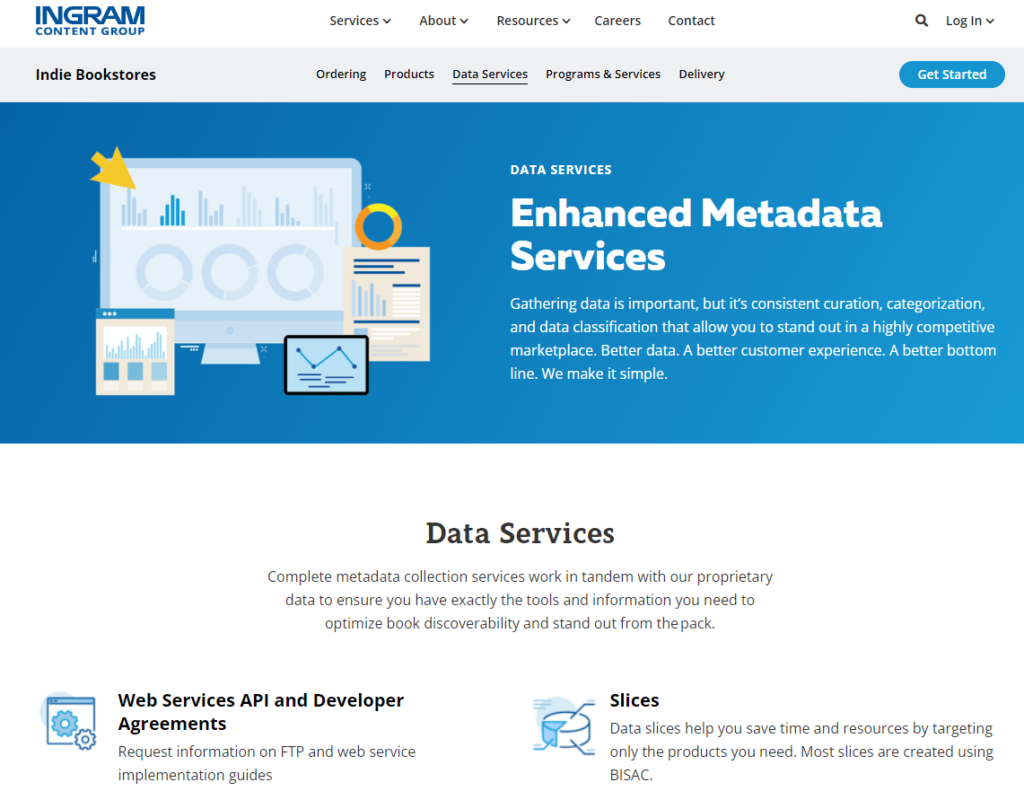
| Free access: | No; price at request. |
| Web Services API and Developer Agreements: | https://www.ingramcontent.com/retailers-request/web-services |
| Volume: | Data from 30,000+ publishers |
| Cover art: | Yes |
| Price information: | N/A |
ISBNdb
ISBNdb is the oldest book database, founded in 2002. It has an API to access book information and allows you to browse the data by categories and obtain title prices from different retailers. It is not a free resource; Depending on your needs, you can choose one of the three plans offered ($14.95/mo, $29.95/mo, or $74.95/mo). However, we can say that the database access is well worth the price. The data is accumulated from scanning various libraries all over the world. Therefore each book has records received from several different libraries.
There are more than 35 million book titles in the database, and each title contains metadata with up to 19 data points (including such information as Dewey decimal number, weight, and subject alongside the usual ISBN10, ISBN13, title, author, publication date, publisher, etc.). Another great benefit of the ISBNdb database is that it’s updated daily and contains information about books in other languages as well as about used, rare, and out of print books.
Since 2004, ISBNdb has also been scanning book retailers for price information and has a lot to share with those seeking active and historic book price information. We can recommend it as one of the reliable resources for comparing book prices.

| Free access: | No; Basic Plan $14.95/mo, Premium Plan $29.95/mo, Pro Plan $74.95/mo |
| API: | https://isbndb.com/apidocs/v2 |
| Volume: | 35M+ entries |
| Cover art: | Yes |
| Price information: | Yes (available with Pro plan, $74.95/mo) |
Open Library
Open Library is a non-profit initiative from the Internet Archive that allows you to freely browse and read books. It is “an open, editable library catalog, building towards a web page for every book ever published.” At the moment, there are more than 20 million titles available in the Open Library database. The information has been collected from various large catalogs and is constantly updated. Since it’s an open project, we can’t promise you’ll have every possible ISBN there. Yet, depending on your needs, you will definitely find a fair share of book information in this database. You can access the library by the API, and you can also download the entire database (dumps of all its data are generated every month).
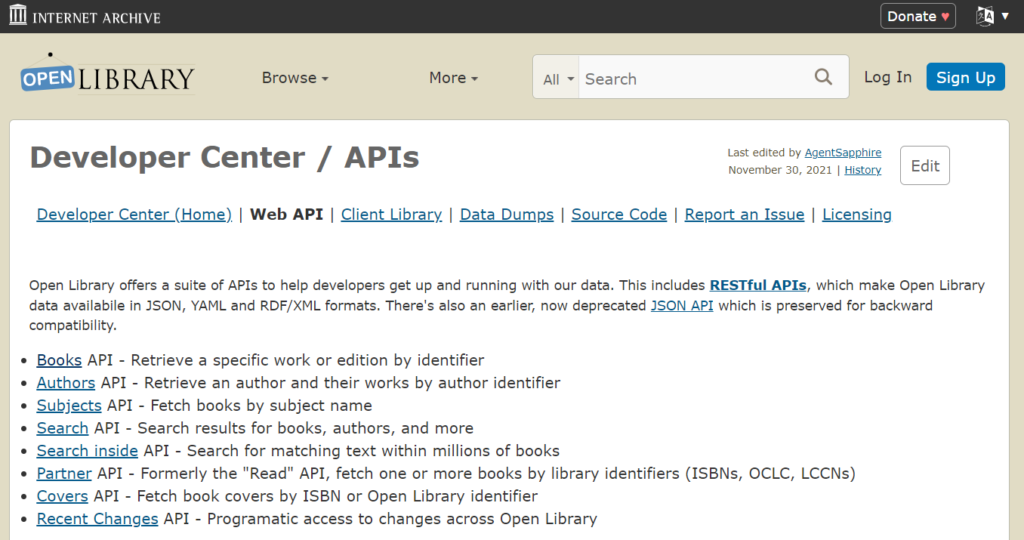
| Free access: | Yes |
| API: | https://openlibrary.org/developers/api |
| Volume: | 20M+ entries |
| Cover art: | Yes |
| Price information: | No |
WorldCat (Owned by OCLC)
WorldCat is “the world’s largest network of library content and services” that connects you to an enormous book database and allows searching the collections of the more than 10,000 libraries participating in the OCLC cooperative. It enables you to access complete bibliographic records of these member libraries and integrate their resources into your website or application via the WorldCat Search API. WorldCat allows retrieving bibliographical records based on OCLC number, ISBN, ISSN, and other identifiers and finding information about the libraries that have cataloged a particular item.
If you are looking for a database with a multi-language ISBN search, WorldCat is probably your best bet. It has books in languages other than English: French, German, Portuguese, Japanese, Chinese, Arabic, etc. It also has other types of media (e.g., DVDs and CDs) and information for titles published before 1980.
If you are affiliated with one of the libraries that contributes to WorldCat, subscribed to WorldCat services, and are interested in creating a new type of app employing library-created bibliographic data, you can access the WorldCat Search API for free. Otherwise, external unaffiliated access is restricted.
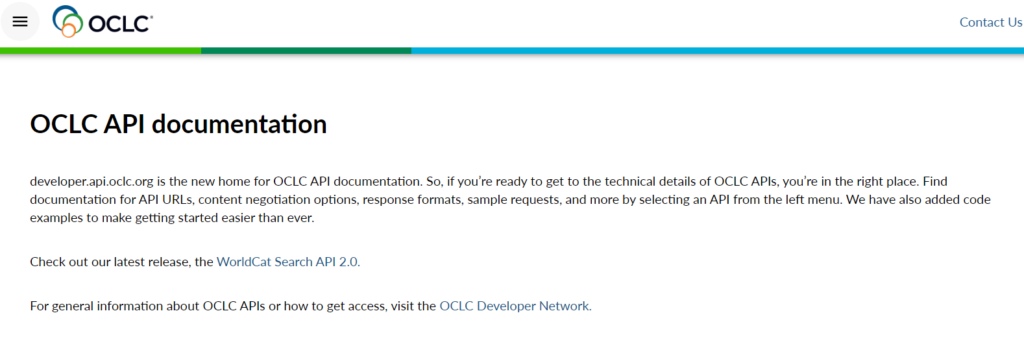
| Free access: | Free but restricted access; Unrestricted access option |
| API (free, restricted): | https://platform.worldcat.org/api-explorer/apis/wcapi |
| API (unrestricted): | http://classify.oclc.org/classify2/api_docs/index.html |
| Volume: | 91M+ entries |
| Cover art: | Yes |
| Price information: | No |
| Multi-language ISBN search: | Yes |
Google Books
Google Books is a digitized book repository maintained by Google. It allows you to search and access the database book content and create and view personalization around it. There are more than 40 million book titles in the database, and you’ll get metadata with the following data points: book information, ratings, reviews, and price information. The latter may be less reliable than the one you can get by accessing other resources. It is, after all, one of the best book databases if you are looking for content (according to some reviewers). Yet, again, it may, however, lack some of the newer books.
You can access the database by using the Google Books API. It is free; however, at some point, the access may be restricted, and you’ll have to use OAuth 2.0 for authentication and authorization.

| Free access: | Yes |
| API: | https://developers.google.com/books/docs/v1/using |
| Volume: | 40M+ titles |
| Cover art: | Yes |
| Price information: | Yes |
Amazon Books
Amazon is a bookseller; therefore, it’s only natural that it has a huge book database. If you want to access this information, you can use the Product Advertising API. It will allow you to search books by ISBN as well as other variables: title, author, publication date, publisher, etc. You can also get additional data on selected titles and verify book details when you need to refresh data.
While access to the Amazon database is advertised as free, it comes with strings attached. To use Product Advertising API, you must register in the Amazon Associates Program. In other words, you should become an Amazon affiliate partner that helps sell Amazon products. In theory, you can register and proceed without selling anything. However, the entire process of registration, approval, and so on seems like overkill unless you run a book reselling business and can integrate Amazon products into your resource naturally. If you simply need access to book information, you should probably choose a more basic alternative.
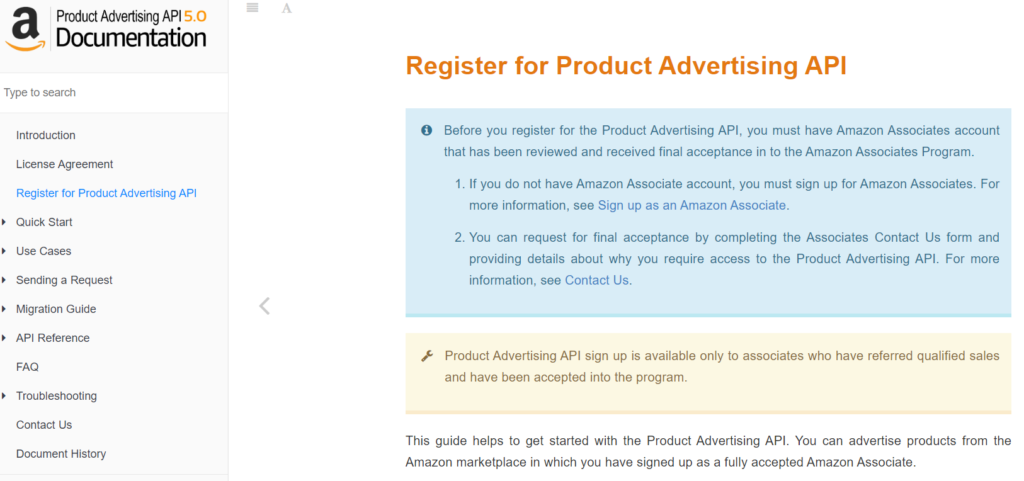
| Free access: | Yes (for Amazon Associates) |
| Product advertising API: | https://webservices.amazon.com/paapi5/documentation/ |
| Affiliation program: | https://affiliate-program.amazon.com/welcome/topic/tools |
| Volume: | Unknown |
| Cover art: | Yes |
| Price information: | Yes |
Book Price Information APIs
If you are specifically interested in accessing book price information, here are several ways you can obtain it:
-
-
- You can use one of the resources mentioned above that provide book price information.
- Become an affiliate partner to one of the book merchants. For instance, AbeBooks will allow you to access their price data if you join their affiliate program. Register, get the client key, and follow the user guide for API access.
- Alternatively, you can check the book price comparison engines (e.g., BookScouter) that have their APIs and are ready to share them.
-
With BookScouter, you can get access to buyback prices of all top buyback vendors (real-time and historical).
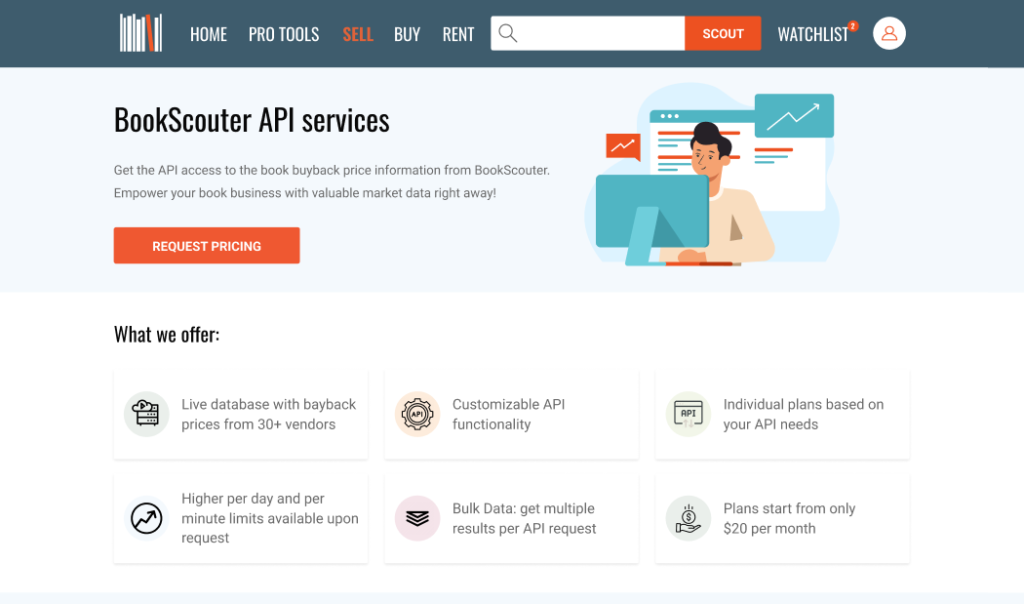
Other Databases
There are other book databases that you can utilize effectively depending on your goals and needs. We’ve looked at the largest and the most popular resources above, and here are some examples of more specific and thematic databases and their APIs:
-
-
- Goodreads has probably the greatest collection of book reviews: 10 million reviews across 700,000 titles. They used to have the Goodreads API (free) that allowed developers to access the database and use all this precious data to create personalized book-related experiences. However, “as of December 8th, 2020, Goodreads no longer issues new developer keys.” Therefore, the database is no longer accessible to new users.
- The New York Times Best Sellers. If you need to retrieve information about New York Times best-seller lists and look up reviews, use the NYT Books API. The service lets you get NYT book reviews by author, ISBN, or title—for free.
- Penguin Random House. If you need access to one of the largest publishing house’s databases, you can use the Penguin Random House API to get information about books, authors, and events.
-
- Bookshare. Bookshare is a service that provides books to readers with print disabilities (e.g., blindness or a learning disability). If you want to design an app with books and reading materials available to such people, you can use the Bookshare API.
- Digital Bibliography Library Project (DBLP). It is a computer science bibliography resource currently operated and maintained by Schloss Dagstuhl—Leibniz-Zentrum für Informatik. A database and logic programming bibliography site, DBPL also has its API search options: for publications, individuals (authors/editors), and venues (journals/conferences/etc.).
- The Web of Science, the information and technology provider for the global scientific research community, has an API that provides access to the extensive database.Web of Science API allows exporting “high-quality full item-level metadata and times-cited counts” of Web of Science documents. It is a great tool for publishers, editors, librarians, researchers, research managers, and information analysts. The API access is paid.
- ScienceDirect, one of the largest online collections of published scientific research in the world, provides ScienceDirect APIs access to retrieve and integrate full-text content from their publications on third-party websites or applications. The use of the APIs is free.
- Directory of Open Access Journals (DOAJ) is an online directory that “indexes and provides access to high quality, open access, peer-reviewed journals.” It provides open access to 17,628 journals and 7,470,016 article records from 130 countries in 80 languages and has a free DOAJ API.
-
You can check a more complete list of various book APIs on the Programmablewe website. It even features such interesting ones as ESV Bible Lookup API, University of Toronto Libraries API, and Bhagavad Gita API, to name a few.
The Final Thoughts
As you can see, there are quite a number of options to access book information via ISBN. You can choose the database most suitable for your needs and objectives. Unfortunately, there are few cheap databases that provide high-quality data. Moreover, most “free” databases either have restricted access or other conditions you have to comply with (e.g., affiliate program membership). Some of these resources may only give you access if you are a book-related or accredited organization or individual. If you are interested in learning more about book APIs, be sure to read the article on the top book APIs.
As of today, we can only conclude that to get the information you need fast and without hassle, you’ll have to resort to paid options. And from our analyses of the existing database offers, ISBNdb seems to be the best in terms of price and quality, with a relatively cheap subscription plan, multiple data points, and high data quality.
We hope that our book database overview will help you find the data you are looking for and that it’ll be of use to everyone in search of quality book data in general.





